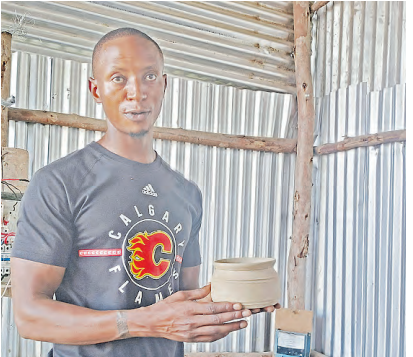
For decades, a university degree was seen as the golden ticket to a secure and prestigious job in Kenya.
Parents pushed their children to pursue careers in medicine, law, and engineering, believing these fields guaranteed financial stability.
However, a new wave of graduates is rewriting the narrative.
Armed with their degrees but disillusioned by unemployment and underemployment, they are venturing into business—turning passion projects into thriving enterprises.
When Augustine Muthomi Kobia graduated from Kenyatta University in 2013 with a Bachelor of Science General with a major in physics, he envisioned a future in research, academia, or engineering.
But today, instead of working in a laboratory, he spends his days shaping clay into stunning ceramic pieces that have caught the attention of both local and international buyers.
As a physics graduate who traded his lab coat for a potter’s wheel and is now reaping the rewards of an unexpected career in ceramics, Kobia says his journey from science to art was not planned.
In 2024, after struggling to find a well-paying job in his field and seeing that employment was going to derail his quest to follow his passion, he decided to quit his career and pursue his dream.
He says that his decision to quit was a hard one even as the country continued to struggle with high unemployment rates.
According to a 2023 report by Kenya National Bureau of Statistics, the number of Kenyans without jobs increased to more than 2.97 million from 2.89 million in the quarter to December 2022, underscoring the labour market woes.
This is further exacerbated by the almost one million graduates that join the job market annually. To him the will to grow his passion was stronger than the market sentiments; he began his entrepreneurial journey in June 2024 when he launched Kobi Ceramics, inspired by a teacher friend who highlighted the scarcity of quality clay for school projects.
Intrigued by the craftsmanship that the clay would bring out, he decided to try his hand at it. What started as a curiosity soon turned into passion.
“My friend told me that schools require students to bring modelling clay, but many don’t know where to get it. That’s when we decided to package and supply it. We tested it in schools, and the reception from teachers was overwhelming,” Kobia recalls.
“I was fascinated by how a lump of clay could transform into something beautiful and functional,” Kobia recalls.
“It reminded me of physics in a way—playing with matter and understanding how different forces shape it.”
With his company situated in Ongata Rongai and with no formal training in this field, Kobia began experimenting with clay.
His science background helped him understand the properties of different types of clay and firing techniques, giving him an edge in creating high-quality ceramics. Initially, the transition was tough.
He says many questioned his decision to abandon a “respectable” career for what they saw as a hobby. But Kobia remained determined. Using his savings at the time to set up a workshop.
“Now we have 30 employees who wake up every day to ensure that the company succeeds,” he says proudly.
His success is part of a growing trend where young Kenyans are embracing unconventional careers, moving away from traditional white-collar jobs to explore creative and entrepreneurial ventures.
Since last year, when the company was born, it has since grown rapidly, currently supplying its Somo Ceramics Modelling Clay to over 500 schools, mostly around Nairobi.
The company has a production capacity of 5,000 packets per day, with an annual output of two million packets.
Despite the industry’s estimated value of Sh12.2 billion, Kenya remains a net importer of ceramics. Kobia hopes to change that by introducing children to locally sourced clay at an early age.
According to 2023 data by United Nations COMTRADE database on international trade, the value of Kenya’s ceramic market, primarily measured by ceramic imports, is around $94.84 million (Sh12.3billion).
However, the journey has not been without challenges. Competing with cheap imports remains a hurdle due to high local production costs.
“We are focusing on quality to stand out in the market, we can’t compete with cheap Chinese imports, but with incentives such as power costs, we can provide quality products to Kenyans,” Kobia says.
Having personally invested over Sh10 million into the venture, Kobia is now eyeing expansion into Nairobi and the Coast region.
“By 2027, I am looking to capture 80 per cent of the Kenyan market, offering both quality and affordability to local consumers.”
Kobia hopes to inspire other young
graduates struggling to find their
footing in the job market.






![[PHOTOS] Kenyan cop killed in Haiti honored in memorial service](/_next/image?url=https%3A%2F%2Fcdn.radioafrica.digital%2Fimage%2F2025%2F03%2Ffe330a65-e87e-4192-a9eb-316010f0ed5b.jpg&w=3840&q=75)




